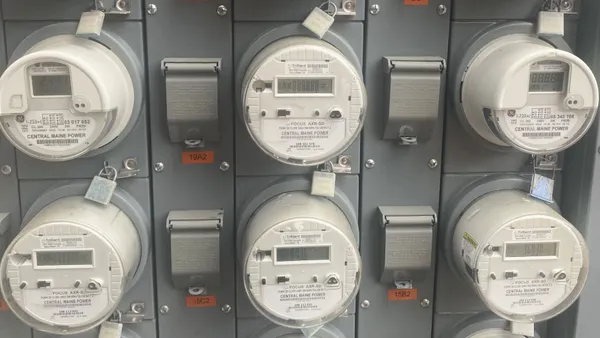Dive Brief:
-
Prices in the PJM Interconnection’s latest capacity auction hit record highs, which should provide incentives for power plant companies to build new generating resources and keep existing ones operating, according to the grid operator.
-
For the majority of the PJM region, capacity prices for the 2025/26 delivery year soared to $269.92/MW-day, up from $28.92/MW-day in the last auction, the grid operator said in an auction report. Prices hit zonal caps of $466.35/MW-day for the Baltimore Gas and Electric zone in Maryland, and $444.26/MW-day for the Dominion zone in Virginia and North Carolina. The auction’s total cost to consumers jumped to $14.7 billion from $2.2 billion in the last auction.
-
The spike in capacity prices was driven by power plant retirements, increased load, and new market rules that aim to better reflect risks from extreme weather — coupled with new resource accreditation metrics that are designed to reflect how much capacity a resource delivers during system stresses, Stu Bresler, PJM executive vice president for market services and strategy, said during a media briefing.
Dive Insight:
The auction prices mainly reflect tighter electricity supply and higher demand, according to Bresler.
Bids were about 6,600 MW lower than in the last auction due to power plant retirements and must-offer exceptions for power plants heading towards shutdown, Bresler said. Also, estimated peak load increased to about 153,000 MW from 150,000 MW, he said.
In the auction, PJM bought 134,672 MW for the capacity year that starts June 1, 2025, according to the grid operator. About 135,694 MW was offered in the auction, not counting energy efficiency resources.
The cleared capacity included about 110 MW of new generation and 755 MW from uprates to existing or planned generation. The quantity of new generation is down from the previous auction where there was nearly 330 MW of new generation.
Gas-fired generation accounted for 48% of the cleared capacity, followed by nuclear at 21%, coal at 18%, demand response at 5%, hydroelectric at 4%, solar and wind at 1% each, and 2% from other resources, according to PJM.
It is unclear how the jump in capacity prices will affect customer bills, according to Bresler. Last year, capacity costs accounted for roughly 8% of customer electric bills, he said.
“We’re finally seeing prices reflect demand, which is increasing at a growing rate,” William Scherman, a partner at Vinson & Elkins, said Wednesday. “One of the key take aways from the auction results is that the recent rash of fossil fuel plant closures is not the reliability red-herring as some people have claimed, since the reliability red-herring has come home to roost.”
The auction results will likely spur power plant developers to build generation in PJM’s footprint, according to the Electric Power Supply Association.
“These price signals recognize the situation PJM faces and should begin to incentivize the investment needed to deliver a reliable system,” EPSA President and CEO Todd Snitchler said in a statement. “While encouraging, the results of one auction do not establish a trend; however, this auction does suggest that the initial market reforms instituted by PJM to address the misalignment [of retiring power plants with replacement generation] had a positive impact.”
The auction’s sky-high clearing prices reflect PJM’s failure to adequately plan ahead, according to Advanced Energy United, a clean energy trade group.
“PJM didn’t prepare for an energy transition we all saw coming, and now consumers are going to pay the price,” Jon Gordon, an AEU director, said in a statement. "PJM fell behind on interconnection and long-term transmission planning years ago, and now the problems are just cascading and piling up.”
PJM said it is concerned with the slow pace of generation construction. Projects totaling about 38,000 MW have cleared PJM’s interconnection queue but have not been built due to challenges such as financing, supply chain, and siting and permitting issues, according to the grid operator.
“Interconnection process reform is proceeding, but hurdles remain for many projects outside of our process,” Bresler said in a press release. “We are considering ways to accelerate those who can successfully overcome those challenges and build.”
All of Constellation Energy’s generating fleet in PJM cleared the auction, including 15,550 MW of nuclear and 1,950 MW of gas and other fuels, the company said Tuesday in a U.S. Securities and Exchange Commission filing. Constellation’s stock price jumped 11% in late morning trading on Wednesday to about $187.50/share.
Vistra cleared 10,255 MW at a weighted average clearing price of $273.45/MW-day the Irving, Texas-based company said in an SEC filing Tuesday. In PJM’s previous capacity auction, Vistra cleared 6,905 MW at a weighted average clearing price of $43.25/ MW-day, equating to about $109 million in capacity revenue for the 2024/2025 planning year. Vistra bought Energy Harbor, which owns about 4,000 MW of nuclear capacity in PJM, on March 1. Vistra’s stock price increased about 14.5% to $79.10/share Wednesday morning.
Talen Energy said it cleared 6,820 MW at $269.92/MW-day, equating to about $670 million in capacity revenues for the 2025/26 planning year.
PJM plans to hold the next base residual auction, for the 2026/2027 delivery year, in December.
PJM typically holds annual capacity auctions, called base residual auctions, to secure capacity three years in advance. The failure to win capacity obligations can be a factor in power plant owners’ decisions to retire those generating units. PJM runs the grid and wholesale power markets in 13 Mid-Atlantic and Midwest states and the District of Columbia.













